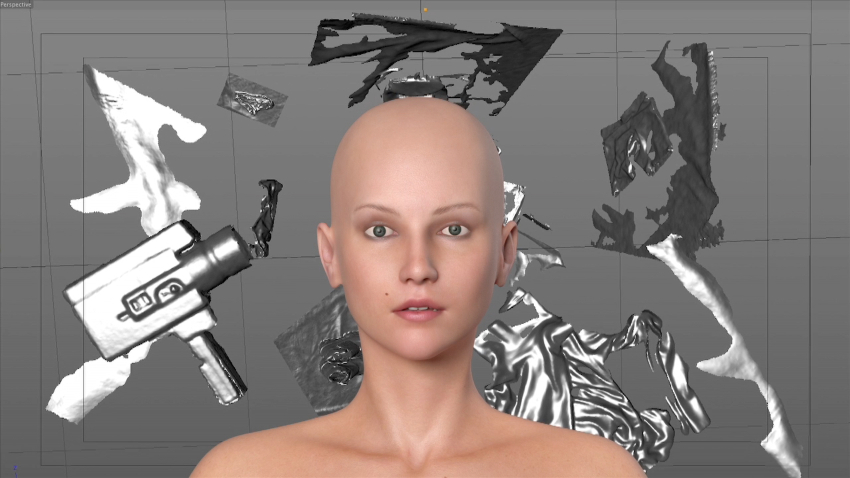Stine Deja’s Cyphoria (2015) is given an in-depth analysis in Simone Rossi’s piece, “On Post-Human: tomorrow will become female,” included in the Issue 05 of Cactus Digitale.
On Post-Human: tomorrow will become female
By Simone Rossi
Les Particules élémentaires, a harsh novel released in 1998 by Michel Houellebecq, is a strategic starting point that reflects on how the Western world is facing and foreshadowing its future and that of the bodies that inhabit it, with the trans- migration of values that this kind of analysis brings with it. Since his first publications, the author has been subjected to fierce criticism, of a prevalently ethical background, for his position against the world, against life, presenting himself as the last of the nihilists, immersing his writings in clinical and aseptic ampoules where feelings and solidarity are kept alive, with little redness, only in characters that perish prematurely or that are misplaced.
Sex, in the book, comes either as a blind and harmful obsession or does not appear at all. Tenderness does not last. Every mode and search for happiness undertaken in human history seems to have been unable to lead to its goal and has ridiculed hippies, the new age, philosophies and methods of meditation. Education towards the new generations loses meaning, life seems reduced to its individual existence, there is no more common knowledge to be transmitted; it is a return to a pre-enlightenment, where Foucault reminds us that it was not so much the man (and all the ontological speculations that follow) that was at the centre of the episteme, but rather the language.
A couple of brothers, two symptomatic characters of the human crisis, Bruno and Michel are the co-protagonists of the novel; the first one is a slave of sexual desire, an insatiable satyr who can only be calmed down by lithium, the latter his opposite and complementary, apathetic brother, who seems to have been given no other quality than thought. He does not entertain relations with anyone, he leads a humble life, solipsistic and indifferent to all that surrounds him. And who can be the Saviour if not Michel? Leading mankind towards the most extraordinary metaphysical (as well as biological) mutation that has ever occurred, which tends towards trans- humanism, towards a sort of Über-Übermensch.
The positivist reason (Comte and Huxley are cited with constancy) as a method for a species that can reproduce genetically in an infinite way, thus becoming immortal (pushing well beyond the genetic optimization of Gattaca). An asexual species, where pleasure does not disappear, but rather it is spread. A mutation to overcome the real, psychological, ontological and contemporary social discomfort.
Personal freedom is emptied of every meaning tied to the idea of neoliberal progress; it is useful to underline the neologism Bannoptikum, coined by the culture theorist Byung-Chul Han, meant to indicate a device made to exclude the Otherness, the hostile or those incapable of adapting, erected by the global neoliberal system, where, instead, only the Equal proliferates (watch Anomalisa), inflamed an entrepreneur’s ego, endowed of narcissistic nature only, with a consequent loss of Eros (love for the other). A Bannoptikum that takes the form of a wellness island surrounded only by fences, prison camps and war (isn’t this about the Western world?)
Lacan claimed that “there is no sexual relation4”. The enjoyment of the One and the enjoyment of the Other are in a non- fundamental relationship. Male sexuality is circumscribed, enclosed around the object, based on possessing, commanded by phallus, and by its specific characteristics that make it lack the relationship with the being of the partner in its totality. On the other hand, the woman is free from the slavery of the foul. This gives the woman additional possibilities but exposes her to a certain fragility of the identity, which leads her to seek confirmation of the being in the desire of the Other.
Today, the omnipresence of pornography is a symptom of the absence of sexual intercourse in human reality, where every copulation seems to be disconnected from a semantic depth, where we are no longer even able to update and redefine the relationships (sexual and not only sexual) that have come to be created with the Other, although these have changed markedly over the years (read Future Sex by Emily Witt). Porn is carried out in the images, and society is moving towards a purely visual dimension, in which narcissism seems to be its most central subject (get Sebastian Zimmerman’s book, Fifty Shrinks).
Michel Djerzinski‘s Prolegomena to perfect replication, the volume written by the protagonist of Houellebecq’s book, will ensure that “tomorrow will become female”, and will therefore give to the man physical immortality. A substantial change in the concept of time also leads to a new philosophy of space and travel. In this regard, I was also impressed by an exhibition by the artist Stine Deja (Danish, b. 1986), called ‘Cyphoria’. Cyphoria is an imaginary travel agency – it offers a space for exploration outside of the body that takes shape in your imagination. It is a new dys/eu-phoria for a future, human-cyborg traveller.
The piece evokes a future world that is entirely centred on technology. The immersive installation crosses between the real and the virtual and the viewers experience of it is trans-dimensional, led by Alena, the travel guide. The physical space around Cyphoria, much like the internet, still requires a brick-and-mortar expression in order to facilitate virtual connections. For this Deja recreated an airport departure lounge at the Annka Kultys Gallery, London, within which the traveller can transition between the virtual space of Cyphoria and the physical installation in which it is hosted. This journey proposes a new way of living, a more acute perception, a disembodied experience in which cyberspace becomes the nervous system of the ‘body’.
Because all in all, post-humanism has to do with the most primordial ontological heuristics. What is the human being? What does it mean to be one? Then, all the projections are mixed with terror and pleasure, fear and hope; post-humanism re-emerges the atavistic division body/mind so dear to us since the days of Plato, with the bitter awareness that we are primarily embodied beings and that mutation will face a situation where, according to Katherine Hayles, “there are no essential differences or absolute demarcations between bodily existence and computer simulation, cybernetic mechanism and biological organism, robot teleology and human goals”.


